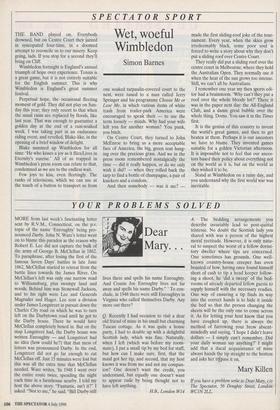YOUR PROBLEMS SOLVED
MORE from last week's fascinating letter sent by R.V.M., Connecticut, on the p.v. topic of the name 'Enroughty' being pro- nounced Darby. John N. Ware's letter went on to blame this paradox as the reason why Robert E. Lee did not capture the bulk of the army of George B. McClellan in 1862. To paraphrase, after losing the first of the famous Seven Days' battles in late June 1862, McClellan started to retreat from the battle lines towards the James River. On McClellan's left was only one narrow road to Williamsburg, plus swampy land and woods. Behind him was Stonewall Jackson, and to his right were Lee and Generals Magruder and Huger. Lee sent a division under James Longstreet in pursuit down the Charles City road on which he was to turn left on the Darbytown road until he got to the Darby house. There he would have McClellan completely boxed in. But on the map Longstreet had, the Darby house was written Enroughty — and Longstreet had no idea (how could he?) that that mess of letters was pronounced Darby. In the end, Longstreet did not go far enough to cut McClellan off. Just 15 minutes were lost but this was all the extra time that McClellan needed. Ware writes, 'In 1948 I went over the entire route twice, spending the night each time in a farmhouse nearby. I told my host the above story. "Fantastic, isn't it?" I asked. "Not to me," he said. "Bill Darby still
Dear Mary.. .
lives there and spells his name Enroughty. And Cousin Joe Enroughty lives not far away and spells his name Darby." ' To con- clude, in 1948 there were still Enroughtys in Virginia who called themselves Darby. Any more out there?
Q. Recently I had occasion to visit a dear old friend of mine in his small but charming Tuscan cottage. As it was quite a house party, I had to double up with a delightful Scottish lady, which was fine. Naturally, when I left (which was before my room- mate), I put a small tip by my bed for staff, but how can I make sure, first, that the maid got her tip, and second, that my host knows it was from me and not my compan- ion? One doesn't want the credit, you understand, but equally one doesn't want to appear rude by being thought not to have left anything.
H.B., London W14 A. The bedding arrangements you describe invariably lead to post-quittal tristesse. No doubt the Scottish lady you shared with was a person of the highest moral rectitude. However, it is only natu- ral to suspect the worst of a fellow dormi- tory dweller where tips are concerned. One sometimes has grounds. One well- known country-house creeper has even boasted of how, having once found himself short of cash to tip a head keeper follow- ing a shoot, he 'did a sweep' of the bed- rooms of already departed fellow guests to supply himself with the necessary readies. One way of ensuring a tip finds its way into the correct hands is to hide it inside the bed so that the person changing the sheets will be the only one to come across it. As for letting your host know that you have coughed up, there is always the method of furrowing your brow absent- mindedly and saying, 'I hope I didn't leave dollars — I simply can't remember. Did your daily woman say anything?' I might add that a ducal acquaintance of mine always hands the tip straight to the hostess and asks her tcbass it on.
Mary Killen
If you have a problem write to Dear Mary, clo The Spectator, 56 Doughty Street, London WC1N 2LL.














































































































 Previous page
Previous page